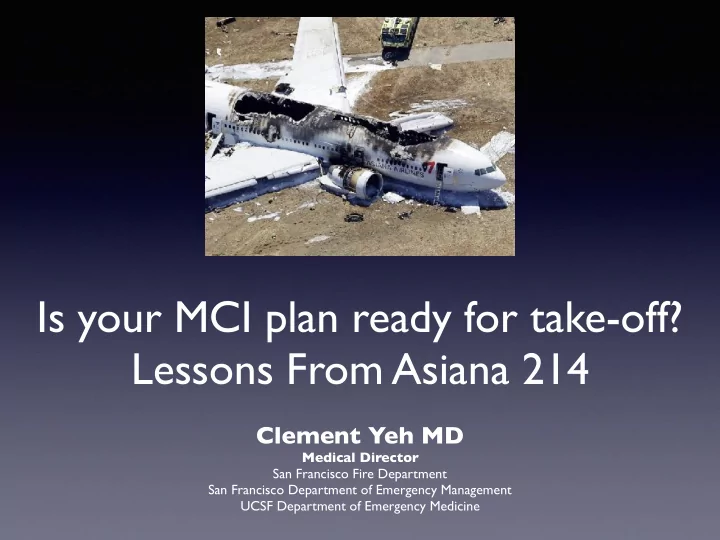

Is your MCI plan ready for take-off? Lessons From Asiana 214 Clement Yeh MD Medical Director San Francisco Fire Department San Francisco Department of Emergency Management UCSF Department of Emergency Medicine
Disclaimer “The opinions expressed in this presentation are those of the authors and may not reflect the official analyses or opinions of the San Francisco Fire Department, American Medical Response, San Francisco Department of Emergency Management, University of California San Francisco, San Francisco International Airport, San Francisco City & County, County of San Mateo, San Mateo County EMSA or the National Transportation Safety Board.”
SF General Hospital Foundation Video
Overview & Objectives • Incident Overview • Melding of MCI Plans • Considerations for change in your area • Pediatric considerations
Take Home Points • Make Disasters “Normal” • Plans + Planning + Practice • Interoperability Challenges • Overall System Management
July 6th, 2013 11:27AM PST
Audio: Dispatch SM
Audio: MCI
Mass Casualty Transport • Ambulance Bus • 15 beds + 10 seated • 26 seated • MCI/Evacuation • Fireground rehab • Mass gathering medical care
SFFD MCT -1 & MCT -2
Incident Timeline City & County of SF San Mateo County 1132 SF Dispatch Notified of Crash 1129 Dispatch Notified of Crash 1134 Initial Dispatch 1130 Dispatch of Level 1 MCI 1134 First Alarm Struck 1130 Activation of EMSystems 1140 Yellow Alert Declared 1130 First Amb On-Scene (AMR NICU Unit) 1145 First SFFD Units On-Scene 1134 First 911 Amb On-Scene 1146 Second Alarm Struck 1137 Level 8 MCI Requested AMR Supervisor 1147 Red Alert Declared, First Amb On 1142/5 SMC EMSA On-Call Notified Scene, IC Established 1304 All Passengers/Crew Off Tarmac 1151 Third Alarm Struck 1326 SMC 911 Ambulances Released to 1159 Modified Response Declared System 1215 Passenger Count & Manifest Reported 1338 Ground Amb Coordinator; declared 1259 All Patients transported from tarmac sufficient ground transport resources on-scene 1917 IC Closes Incident 1746 EMS Branch Secured
Communications • Language barriers • Instantaneous • Comm overload should be expected • Mitigating factors • Interpreters • Redundancy • Fallback plans
Communications
Patient Characteristics • 307 on board • 291 Passengers • 16 Crew • 175+ patients transported to area hospitals
Patient Distribution • Language resources • Reunification • Special populations • Trauma • Burns • Pediatrics
Patient Distribution: Counties Eden 1% Stanford (2) 32% San Francisco (57) 50% (88) San Mateo 16% (29)
Patient Distribution: Hospitals • Stanford: 56 • SFGH: 53 • Mills Peninsula: 14 • UCSF: 14 • Kaiser Redwood City: 10 • CPMC (all campuses): 9 • Kaiser San Francisco: 5 • St. Francis: 7 • Sequoia Hospital: 5 • St. Mary’s: 4 • Eden: 2
Patient Distribution: Timeline (SFGH) • 1300 First Wave: 10 patients: 5 critical, 5 serious • 1600 Second Wave : 17 patients: critical to good condition • 1700-1900 Third & Fourth Wave 25 patients • Sunday 2100: 5th Wave 9 patients • Monday: 6th Wave 4 patients, all children
Patient Distribution
Surge Capacity • Increased space • Increased resources • Increased staffing? • Reverse Triage
SF 911 System Impact
SF System Impact • UHU = Utilization/ Units x 0.5 0.41 Staffed Hours 0.4 0.40 0.375 0.38 • Goal Transport UHU = 0.35 - 0.44 0.25 • SF 2013 YTD UHU = 0.38 (SD 0.04) • 0.125 SF 2013 Saturdays UHU = 0.40 (SD 0.04) • Saturday 7/6/13 UHU = 0.41 0 Goal YTD Sat 7/6/13
San Mateo 911 System Impact 7 of 16 911 Ambulances Sent to Crash AMR Surge Plan and MCI Plans Inter-Facility Surge Unit In County Mutual Aid South SF Fire Inter-Facility BLS Inter-Facility Network Providers Special Operations Team Call Back Corporate Resources Response Time Compliance 92.1%
The End? • Patient Reunification • Law Enforcement • Post Incident Analysis • CISD
Take Home Points • Make Disasters “Normal” • Plans + Planning + Practice • Interoperability Challenges • Overall System Management
Recommend
More recommend